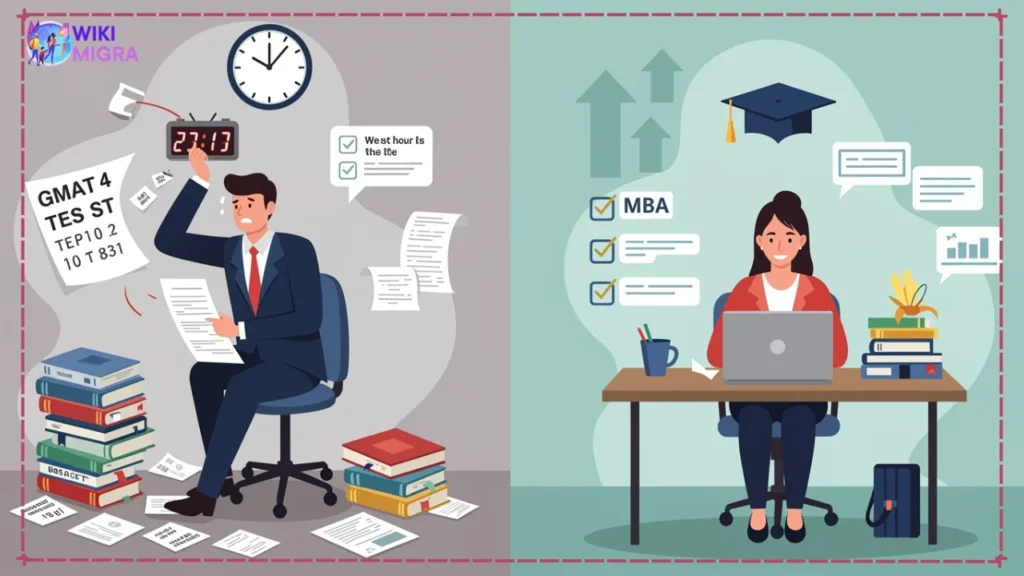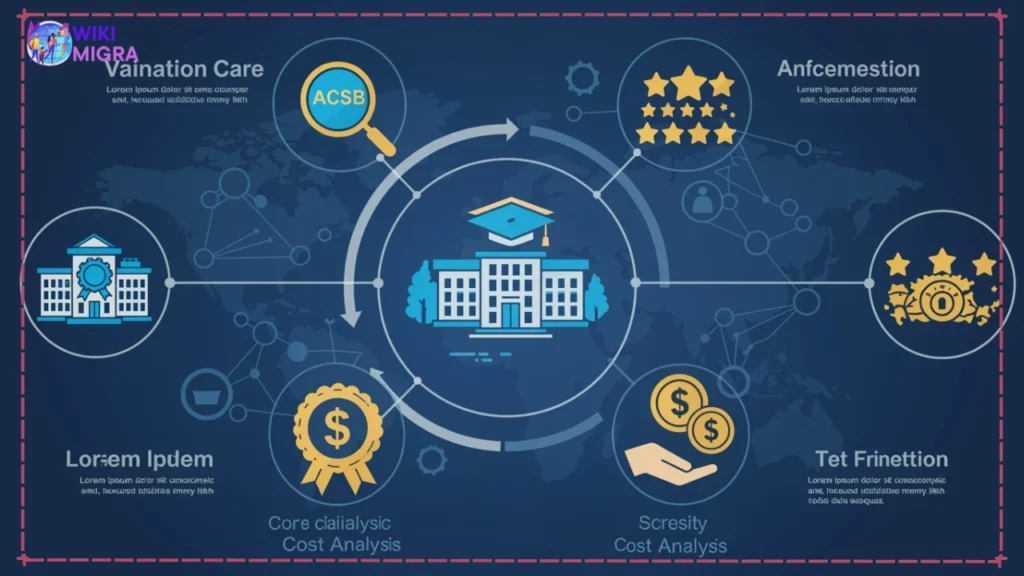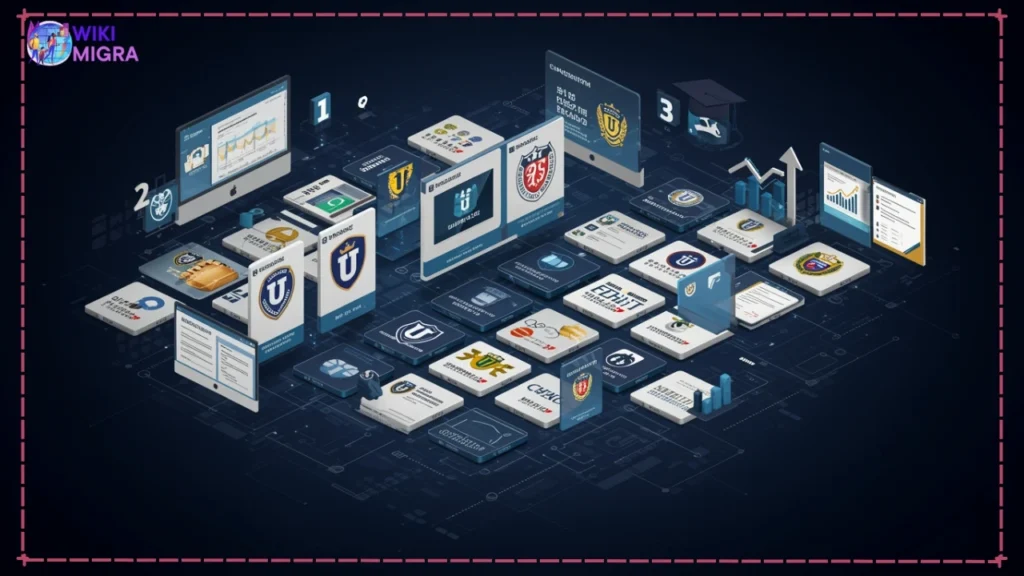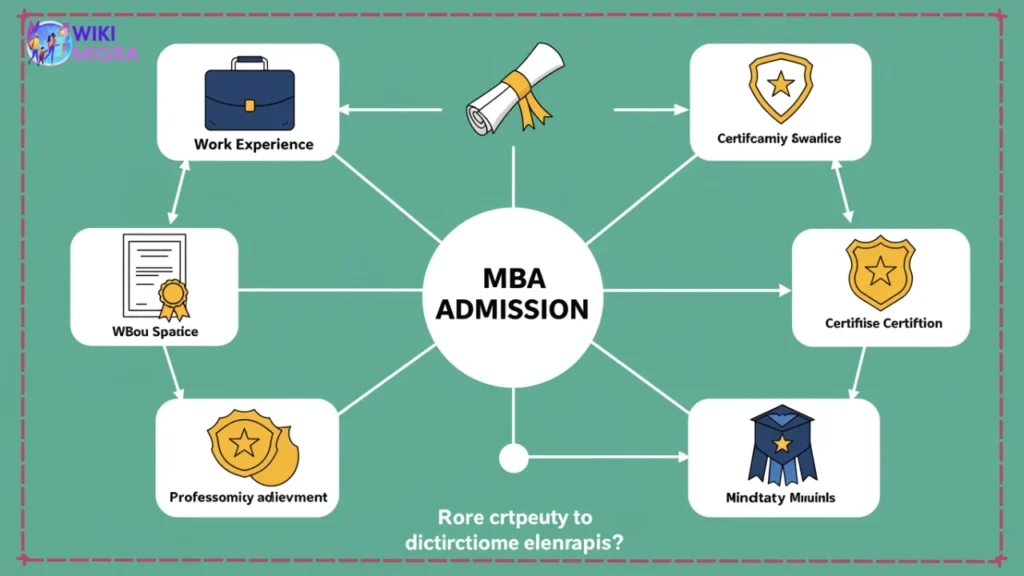The Best Online MBA Programs Without GMAT: Your Complete 2025 Guide to Top-Tier Education

🚀 Best online MBA programs without GMAT are revolutionizing graduate business education for working professionals. Are you ready to advance your career with an MBA but dreading the GMAT preparation process? You’re not alone. The Graduate Management Admission Test can be a significant barrier for busy professionals who want to pursue higher education without sacrificing months to test prep. The good news? Many of the best online MBA programs without GMAT requirements are now available, offering the same quality education and career advancement opportunities as traditional programs.
This comprehensive guide breaks down the top best online MBA programs without GMAT options available in 2025, complete with detailed waiver criteria, program features, and everything you need to make an informed decision. Whether you’re a seasoned executive or a mid-career professional, we’ll help you find the perfect best online MBA programs without GMAT that aligns with your goals and schedule.
➡️ Learn more about: Finding Your Perfect Fit: A Guide to Good Colleges in San Francisco (and the Bay Area)
🧠 Why the Best Online MBA Programs Without GMAT Are Game-Changers

The Strategic Advantages
Choosing an online mba no gmat program isn’t just about avoiding test anxiety—it’s a strategic decision that offers multiple benefits for today’s working professionals:
Time and Cost Efficiency: GMAT preparation typically requires 100-200 hours of study time and costs between $250-$2,000 when including prep materials, courses, and multiple test attempts. According to the Graduate Management Admission Council (GMAC), the average GMAT test-taker spends 3-4 months preparing. By choosing the best online MBA programs without GMAT policies, you can redirect this time and money toward your actual education.
Focus on Real-World Experience: Many schools recognize that professional accomplishments and leadership experience are better predictors of MBA success than standardized test scores. The best online MBA programs without GMAT evaluate your practical knowledge, management skills, and career progression instead.
Increased Accessibility: The best online MBA programs without GMAT make MBA education more accessible to non-traditional students, career changers, and international professionals who may not perform well on standardized tests despite having strong professional credentials.
Common GMAT Waiver Scenarios
Universities typically offer best online MBA programs without GMAT under these circumstances:
- Professional Experience: Usually 3-7 years of progressively responsible work experience
- Academic Achievement: Undergraduate GPA of 3.0 or higher (varies by institution)
- Advanced Degrees: Holding a master’s degree, JD, PhD, or other graduate-level qualification
- Professional Certifications: CPA, CFA, PMP, or other relevant industry certifications
- Military Leadership: Significant military leadership experience and training
Debunking the Prestige Myth
Are no-GMAT MBAs less prestigious? Absolutely not—when you choose accredited programs. The key differentiator isn’t GMAT requirements but accreditation status. AACSB-accredited MBA programs maintain the same rigorous academic standards regardless of admission requirements. According to AACSB International, less than 5% of business schools worldwide achieve AACSB accreditation. In fact, many Fortune 500 companies actively recruit from the best online MBA programs without GMAT because they value practical experience over test scores. These best online MBA programs without GMAT often produce graduates who excel in leadership roles precisely because they emphasize real-world experience over test-taking ability.
➡️ Learn more about: San Francisco Top Universities: The Ultimate Guide (2025)
🔎 Our Methodology: Ranking the Best Online MBA Programs Without GMAT

Transparency is crucial when evaluating educational investments. Our ranking methodology for the best online MBA programs without GMAT considers multiple factors to ensure you receive accurate, trustworthy recommendations:
Primary Evaluation Criteria
- Accreditation Quality: AACSB, ACBSP, and IACBE accreditation status
- GMAT Waiver Accessibility: Clarity and generosity of waiver policies
- Curriculum Strength: Comprehensiveness and relevance of coursework
- Faculty Credentials: Academic qualifications and industry experience
- Student Support Services: Career services, academic advising, technical support
- Program Flexibility: Scheduling options, course delivery methods
- Career Outcomes: Employment rates, salary increases, alumni success
- Cost-Value Ratio: Tuition costs relative to program benefits
Our ranking considers accreditation, curriculum quality, GMAT waiver policies, and overall value to ensure students receive the best possible return on their educational investment.
➡️ Learn more about: Can You Get a Psychology Degree Online in the UK
🎓 The List: Top Online MBA Programs Without GMAT Requirements

Finding the best online MBA programs without GMAT requirements requires thorough research and comparison. Here are our top-ranked programs for 2025:
1. Arizona State University (ASU) – W.P. Carey School of Business
Program Name: Online MBA
Accreditation: AACSB
GMAT Waiver Policy: GMAT waived for applicants with:
- 3+ years of progressive work experience
- Undergraduate GPA of 3.0 or higher
- Graduate degree from an accredited institution
Key Features/Specializations:
- Business Analytics and Information Management
- Finance
- Healthcare Management
- Supply Chain Management
Program Length/Flexibility: 12-24 months, fully asynchronous with some live sessions
Estimated Cost: $1,320 per credit hour (60 credits total)
Why It’s on Our “Best” List: ASU’s online MBA consistently ranks among the top programs nationally, offering exceptional flexibility for working professionals and a robust alumni network spanning Fortune 500 companies. Learn more about ASU’s Online MBA program and explore their admission requirements.
2. Penn State World Campus – Smeal College of Business
Program Name: Online MBA
Accreditation: AACSB
GMAT Waiver Policy: GMAT waived for applicants with:
- 5+ years of professional experience
- Undergraduate GPA of 3.2 or higher
- Master’s degree or higher
Key Features/Specializations:
- Corporate Innovation and Entrepreneurship
- Finance
- Marketing and Brand Management
- Supply Chain and Information Systems
Program Length/Flexibility: 24-36 months, asynchronous with optional residencies
Estimated Cost: $1,284 per credit hour (48 credits total)
Why It’s on Our “Best” List: Penn State’s reputation for excellence, combined with generous waiver policies and strong corporate partnerships, makes this an ideal choice for experienced professionals. Visit Penn State World Campus MBA page for detailed program information and application requirements.
3. University of Massachusetts Amherst – Isenberg School of Management
Program Name: Online MBA
Accreditation: AACSB
GMAT Waiver Policy: GMAT automatically waived for:
- 4+ years of managerial experience
- Undergraduate GPA of 3.2+
- CPA, CFA, or equivalent professional certification
Key Features/Specializations:
- Business Analytics
- Finance
- Marketing
- Operations and Information Management
Program Length/Flexibility: 20 months, cohort-based with flexible scheduling
Estimated Cost: $1,200 per credit hour (40 credits total)
Why It’s on Our “Best” List: UMass Amherst offers exceptional value with lower tuition costs while maintaining AACSB accreditation and strong regional business connections. Explore UMass Amherst’s Online MBA to learn about their flexible program structure.
4. University of Wisconsin-Madison School of Business
Program Name: Online MBA Consortium
Accreditation: AACSB
GMAT Waiver Policy: GMAT waived for applicants with:
- 7+ years of professional experience
- Leadership roles and career progression
- Undergraduate GPA of 3.0+
Key Features/Specializations:
- Applied Security and Information Assurance
- Marketing Research
- Operations and Technology Management
- Real Estate
Program Length/Flexibility: 24 months, weekend format
Estimated Cost: $1,406 per credit hour (45 credits total)
Why It’s on Our “Best” List: Wisconsin’s strong Midwest business connections and reputation for innovation make it ideal for professionals in manufacturing, technology, and healthcare sectors. Learn about University of Wisconsin’s Online MBA Consortium for program details and admission criteria.
5. University of North Carolina at Chapel Hill – Kenan-Flagler Business School
Program Name: MBA@UNC Online
Accreditation: AACSB
GMAT Waiver Policy: GMAT waived for candidates with:
- 5+ years of work experience
- Strong undergraduate academic record (3.0+ GPA)
- Demonstrated leadership experience
Key Features/Specializations:
- Entrepreneurship
- Finance
- Marketing
- Strategy and Consulting
Program Length/Flexibility: 18-24 months, live online classes
Estimated Cost: $2,400 per credit hour (60 credits total)
Why It’s on Our “Best” List: UNC’s prestigious reputation and strong alumni network provide exceptional career advancement opportunities, particularly in consulting and finance. Visit MBA@UNC online program page to explore their innovative online learning platform.
6. Georgia Southern University – Parker College of Business
Program Name: Online MBA
Accreditation: AACSB
GMAT Waiver Policy: GMAT waived for applicants with:
- 3+ years of work experience
- Undergraduate GPA of 2.75+
- Graduate degree from accredited institution
Key Features/Specializations:
- General Management
- Healthcare Administration
- Information Systems
- International Business
Program Length/Flexibility: 24-36 months, fully online and asynchronous
Estimated Cost: $449 per credit hour (36 credits total)
Why It’s on Our “Best” List: Exceptional affordability combined with AACSB accreditation makes this program an outstanding value for budget-conscious students.
7. University of Maryland Global Campus
Program Name: Online MBA
Accreditation: ACBSP
GMAT Waiver Policy: GMAT waived for all applicants with:
- Bachelor’s degree from accredited institution
- 2+ years of work experience
- Minimum 2.5 undergraduate GPA
Key Features/Specializations:
- Accounting and Financial Management
- Digital Marketing and Analytics
- Healthcare Management
- Project Management
Program Length/Flexibility: 12-24 months, 8-week accelerated courses
Estimated Cost: $659 per credit hour (36 credits total)
Why It’s on Our “Best” List: UMGC’s military-friendly policies and accelerated format make it perfect for veterans and active-duty service members seeking rapid career advancement.
8. Colorado State University Global
Program Name: Online MBA
Accreditation: ACBSP
GMAT Waiver Policy: GMAT automatically waived for all applicants
Key Features/Specializations:
- Finance
- Healthcare Management and Leadership
- Information Technology Management
- Marketing
- Organizational Leadership
Program Length/Flexibility: 12-24 months, 8-week terms
Estimated Cost: $725 per credit hour (36 credits total)
Why It’s on Our “Best” List: 100% online format with no GMAT requirement makes this program highly accessible for working professionals seeking immediate enrollment.
9. Southern New Hampshire University
Program Name: Online MBA
Accreditation: NECHE (regionally accredited)
GMAT Waiver Policy: GMAT waived for all applicants
Key Features/Specializations:
- Accounting
- Finance
- Healthcare Management
- Human Resource Management
- Marketing
- Operations and Project Management
Program Length/Flexibility: 15 months, 10-week terms
Estimated Cost: $627 per credit hour (36 credits total)
Why It’s on Our “Best” List: SNHU’s competency-based learning model and extensive support services cater specifically to adult learners and career professionals.
10. University of Arizona Global Campus
Program Name: Online MBA
Accreditation: HLC (regionally accredited)
GMAT Waiver Policy: GMAT waived for applicants with:
- Bachelor’s degree from accredited institution
- Minimum 2.5 undergraduate GPA
- Professional experience preferred
Key Features/Specializations:
- Accounting
- Business Intelligence
- Global Management
- Human Resources
- Technology Management
Program Length/Flexibility: 12-24 months, 5-week courses
Estimated Cost: $698 per credit hour (33 credits total)
Why It’s on Our “Best” List: Flexible scheduling and affordable tuition combined with University of Arizona’s academic reputation create excellent value for working professionals.
➡️ Learn more about: Which Accreditation is Best for Psychology
🔑 Understanding GMAT Waiver Criteria in Detail

Work Experience Requirements
Most best online MBA programs without GMAT require 3-7 years of professional experience, but the quality matters more than quantity. According to the U.S. Bureau of Labor Statistics, management positions typically require several years of work experience. When evaluating candidates for the best online MBA programs without GMAT, schools look for:
- Progressive responsibility: Promotions, increased scope, leadership roles
- Managerial experience: Direct reports, budget responsibility, strategic decision-making
- Industry relevance: Experience in business, management, or related fields
- Achievement documentation: Quantifiable accomplishments and career growth
Academic Performance Standards
GPA requirements typically range from 2.5-3.2, but schools consider:
- Degree recency: More recent academic performance carries greater weight
- Major relevance: Business, economics, or STEM degrees may receive preference
- Grade trends: Improvement over time demonstrates academic growth
- Course rigor: Challenging coursework and honors recognition
Alternative Qualifications
Beyond work experience and GPA, the best online MBA programs without GMAT may waive requirements for:
Professional Certifications:
- CPA (Certified Public Accountant)
- CFA (Chartered Financial Analyst)
- PMP (Project Management Professional)
- FRM (Financial Risk Manager)
- CMA (Certified Management Accountant)
Advanced Degrees:
- Master’s degrees in any field
- JD (Juris Doctor)
- PhD or doctoral degrees
- Professional degrees (MD, PharmD, etc.)
Military Experience:
- Officer-level leadership positions
- Military education and training completion
- Combat or operational leadership experience
Tips for Highlighting Qualifications
When applying to the best online MBA programs without GMAT, research from the National Association of Student Financial Aid Administrators (NASFAA) shows that students who apply early have better access to financial aid and scholarship opportunities. Here’s how to maximize your chances with the best online MBA programs without GMAT:
- Quantify achievements: Use specific numbers, percentages, and dollar amounts
- Demonstrate leadership: Highlight team management, project leadership, and strategic initiatives
- Show progression: Document career advancement and increasing responsibilities
- Connect experience to MBA goals: Explain how your background prepares you for graduate-level business study
How to Identify the Best Online MBA Programs Without GMAT for Your Career
When evaluating the best online MBA programs without GMAT requirements, consider these essential factors to make the right choice for your professional goals:
Career Goal Alignment
For Corporate Leadership: Choose AACSB-accredited programs with strong alumni networks in Fortune 500 companies. The best online MBA programs without GMAT for corporate advancement include ASU, Penn State, and UNC.
For Entrepreneurship: Look for the best online MBA programs without GMAT with innovation focuses and startup incubators (UNC, Wisconsin)
For Career Change: Select the best online MBA programs without GMAT with broad specializations and career services support (UMGC, SNHU)
For Rapid Advancement: Consider accelerated formats and competency-based programs (CSU Global, SNHU)
Budget Considerations
| Price Range | Examples | Best For |
|---|---|---|
| Under $25,000 | Georgia Southern, UMGC | Budget-conscious students |
| $25,000-$50,000 | ASU, Penn State, UMass | Balanced value and prestige |
| $50,000+ | UNC Chapel Hill | Maximum prestige and network |
Learning Style Preferences
Self-Directed Learners: Choose asynchronous programs (ASU, Georgia Southern)
Interactive Learners: Select live online or hybrid formats (UNC, Wisconsin)
Accelerated Learners: Consider 8-week terms and fast-track options (CSU Global, UMGC)
Accreditation Importance
Always prioritize accredited programs:
- AACSB: Gold standard for business education (ASU, Penn State, UNC, etc.)
- ACBSP: Strong alternative accreditation (UMGC, CSU Global)
- Regional Accreditation: Minimum acceptable standard (SNHU, University of Arizona Global Campus)
Self-Assessment Checklist
Before choosing your program, consider:
✓ Career Goals: What position do you want in 3-5 years? ✓ Time Commitment: How many hours per week can you dedicate to studies? ✓ Learning Preference: Do you prefer live interaction or self-paced learning? ✓ Budget: What’s your total education budget including opportunity costs? ✓ Support Needs: Do you need extensive student services and career counseling? ✓ Network Goals: How important are alumni connections in your target industry?
➡️ Learn more about: Online Business Management Degree Programs Accredited 2025
🧭 How to Choose the Right No-GMAT Online MBA For You
A growing number of online Master of Business Administration (MBA) programs have eliminated or waived the Graduate Management Admission Test (GMAT) requirement, making advanced business education more accessible to working professionals. This trend reflects a broader shift in admissions strategies, prioritizing holistic reviews that consider professional experience, undergraduate academic performance, and other qualifications over a single standardized test score. As of May 23, 2025, numerous reputable institutions offer online MBA programs without mandatory GMAT scores.
Historically, the GMAT has been a standard component of MBA applications, designed to assess a candidate’s analytical, quantitative, verbal, and writing skills, and to predict success in a rigorous graduate business curriculum. However, in recent years, many business schools, particularly those offering online programs, have re-evaluated its necessity. Several factors contribute to this shift:
Benefits of Pursuing a No-GMAT Online MBA
- Focus on Professional Experience: Many online MBA candidates are seasoned professionals with significant work experience. Schools increasingly recognize that practical leadership, problem-solving skills, and career progression can be stronger indicators of future success than a standardized test score.
- Accessibility and Flexibility: Waiving the GMAT removes a significant barrier for busy working professionals who may not have the time or resources for extensive test preparation. This enhances accessibility, allowing individuals to pursue higher education without disrupting their careers.
- Holistic Review: Admissions committees are moving towards a more comprehensive evaluation of applicants, considering undergraduate GPA, essays, letters of recommendation, interviews, and professional achievements. This allows for a more nuanced understanding of a candidate’s potential.
- Diverse Applicant Pool: Eliminating the GMAT can attract a more diverse pool of applicants, including those from non-traditional academic backgrounds or those who may not perform well on standardized tests despite possessing strong business acumen.
- Cost Savings: For applicants, opting out of the GMAT saves on test preparation materials and exam fees, which can be substantial.
Beyond the waived test requirement, online MBA programs offer several advantages, particularly for working professionals:
- Flexibility: Online programs are often designed with asynchronous coursework and flexible schedules, allowing students to balance their studies with full-time employment and personal commitments.
- Return on Investment (ROI): A significant majority (94%) of online MBA students and graduates surveyed believe earning an online degree has had or will have a positive financial return [1]. For instance, 2024 graduates from the University of Iowa’s online MBA reported a 30% average salary increase within four months of graduation.
- Career Advancement: An MBA can lead to increased career options, higher earning potential, and opportunities for leadership roles.
- Networking: Many online programs incorporate collaborative learning opportunities and networking events, fostering connections with peers and faculty.
While the absence of a GMAT requirement simplifies the application process, prospective students should carefully evaluate other aspects of a program:
Key Considerations When Choosing a No-GMAT Online MBA
- Accreditation: Ensure the program is accredited by a reputable agency, such as the Association to Advance Collegiate Schools of Business (AACSB) for business programs, and regionally accredited by bodies like the Southern Association of Colleges and Schools Commission on Colleges (SACSCOC) or the Higher Learning Commission (HLC). Accreditation signifies quality and is crucial for transferability of credits and employer recognition.
- Admissions Criteria: Even without the GMAT, schools will have other requirements, such as a minimum undergraduate GPA, a certain number of years of professional work experience, essays, and letters of recommendation.
- Program Structure and Curriculum: Consider the program’s length, delivery format (synchronous, asynchronous, hybrid), core courses, and available specializations (e.g., finance, marketing, data analytics, healthcare management).
- Affordability and Financial Aid: Tuition rates vary significantly between public and private institutions, and by program. The average yearly tuition for an MBA was about $18,340 in 2020, with public schools generally being less expensive than private ones. Inquire about scholarships, fellowships, and federal financial aid options.
- Student Outcomes and Reputation: Research graduation rates, retention rates, and post-graduation career success, including salary increases and job placement. A school’s overall reputation and rankings can also be important.
- Faculty and Resources: Look into the faculty’s expertise and the availability of student support services, career counseling, and alumni networks.
As of May 23, 2025, several accredited universities offer online MBA programs that are GMAT-optional or provide waivers based on specific criteria, catering to the needs of working professionals:
Reputable Institutions Offering Online MBAs with No GMAT Requirement or Waivers
- East Carolina University (Greenville, NC): This program offers a GMAT waiver subject to review, typically requiring a 3.2 GPA or 5+ years of relevant professional experience. It emphasizes real-world experience and offers electives in high-demand fields like business analytics and healthcare management.
- Oklahoma State University (Stillwater, OK): The Spears School of Business MBA program requires three years of work experience or competitive GMAT/GRE scores for admission. It is highly affordable and can be completed in as little as 16 months.
- Creighton University (Omaha, NE): GMAT waivers are available, with 1-3 years of work experience preferred. Creighton’s online MBA has a strong focus on finance and offers concentrations in areas like business intelligence and personal financial planning.
- University of Iowa (Iowa City, IA): This program explicitly states no GMAT scores are required, but applicants need a minimum 3.0 undergraduate GPA and 18 months of work experience. It boasts a high graduation rate and significant post-graduation salary increases.
- Dominican University (River Forest, IL): The MBA program is GMAT optional and can be completed in as little as a year. It includes a “Business Gateway” practicum for real-world experience and offers certificates in data analytics and healthcare administration.
- Louisiana Tech University (Ruston, LA): A 3.2 minimum GPA is required to qualify for a GMAT waiver. This program is designed for working professionals, offering specializations in areas like aviation, marketing, and Six Sigma, with a focus on high-demand skills.
- University of North Carolina at Chapel Hill (Chapel Hill, NC): The UNC Kenan-Flagler Business School’s online MBA requires the GMAT or GRE for applicants with fewer than five years of professional experience. It offers six concentrations and a significant return on investment, with students reporting an average salary increase of 24% after graduation.
- University of Florida (Gainesville, FL): The UF Warrington College of Business offers both one-year and two-year online MBA programs where the GRE or GMAT is optional. The program emphasizes experiential learning and global immersion opportunities.
- William & Mary (Williamsburg, VA): The Raymond A. Mason School of Business online MBA program makes the GRE or GMAT optional. It can be completed in two years and offers a certification in business analytics foundations.
- University of Illinois Urbana-Champaign (Champaign, IL): The UIUC Gies College of Business iMBA program is 100% online and makes the GRE or GMAT optional. It allows students to tailor their degree through specializations and capstones, with a recommended 3.0 GPA for admission.
The increasing availability of no-GMAT online MBA programs signifies a positive shift towards more inclusive and experience-based admissions processes, making advanced business education more attainable for a broader range of qualified individuals.
➡️ Learn more about: Can You Get an MBA Without a Bachelor’s in Business? Complete Guide for Non-Business Majors
✍️ Application Tips for No-GMAT Online MBA Programs

Strengthening Your Application Without GMAT Scores
The best online MBA programs without GMAT requirements are becoming increasingly competitive, making it crucial to strengthen other aspects of your application. Since you won’t have GMAT scores to showcase analytical abilities when applying to the best online MBA programs without GMAT, other application components become crucial:
Professional Resume Enhancement:
- Quantify all achievements with specific metrics
- Highlight leadership roles and team management experience
- Include relevant certifications and professional development
- Show career progression and increasing responsibilities
Compelling Personal Statement:
- Articulate clear career goals and MBA necessity
- Connect past experiences to future aspirations
- Demonstrate business acumen through specific examples
- Address any academic or professional gaps honestly
Strong Recommendation Letters:
- Choose recommenders who can speak to your managerial potential
- Brief recommenders on your MBA goals and target programs
- Provide specific examples they can reference
- Include at least one supervisor or senior colleague
Highlighting Relevant Experience
Leadership Examples:
- Team sizes managed and outcomes achieved
- Cross-functional project leadership
- Process improvements and efficiency gains
- Strategic initiative development and execution
Business Impact Documentation:
- Revenue growth or cost savings generated
- Market expansion or customer acquisition
- Operational improvements and metrics
- Innovation projects and implementations
Professional Development:
- Industry conferences and continuing education
- Professional association memberships
- Relevant coursework or certifications
- Mentoring and knowledge-sharing activities
Common Application Mistakes to Avoid
❌ Generic personal statements – Customize for each program ❌ Weak recommender choices – Avoid peers or distant supervisors
❌ Incomplete experience documentation – Provide specific examples and metrics ❌ Ignoring program-specific requirements – Read application instructions carefully ❌ Late applications – Apply early for better consideration and scholarship opportunities
➡️ Learn more about: Explore Online Business Degree Programs Accredited
Do I need GMAT for online MBA?
No, you do not always need a GMAT score for an online MBA. Many reputable online MBA programs have waived or do not require the Graduate Management Admission Test (GMAT) for admission. This allows prospective students to pursue an MBA without the stress and time investment of standardized testing.
Instead of GMAT scores, these programs often prioritize an applicant’s professional experience, career growth history, and community involvement. Requirements can include a minimum number of years of work experience (ranging from two to seven years), a resume or curriculum vitae (CV), letters of recommendation, and sometimes a video interview. Some institutions, like the University of Edinburgh Business School, do not make the GMAT a compulsory part of their online MBA application process, though it may be required if academic prerequisites are not met, or welcomed if submitted. The trend of waiving GMAT requirements has become more common across various business schools, particularly for applicants with strong undergraduate academic records or significant managerial experience, providing greater flexibility and accessibility for individuals balancing work, life, and education.
Which MBA does not need GMAT?
Many MBA programs no longer strictly require the GMAT, GRE, or Executive Assessment (EA) test, either by making them optional or by offering waivers based on an applicant’s academic and professional background. This trend has increased flexibility for prospective students, especially for online programs designed for working professionals.
Full-time MBA programs that do not require a GMAT, GRE, or EA test score include:
- Babson Olin
- Georgia Tech Scheller
- Michigan Ross (applicants can submit a Statement of Academic Readiness instead of a test score)
- Rochester Simon
- SMU Cox
- UCLA Anderson
- Washington Foster
- Washington U Olin
Many other full-time MBA programs offer test waivers, allowing applicants to forgo submitting a GMAT or GRE score if they meet specific criteria, such as strong academic performance, significant work experience, or relevant certifications. These programs include, but are not limited to:
- Arizona State Carey
- Boston College Carroll
- Carnegie Mellon Tepper
- Cornell Johnson
- Dartmouth Tuck (limited waivers available based on work experience and quantitative proficiency)
- Emory Goizueta
- Georgia Terry
- Indiana Kelley
- Johns Hopkins Carey
- Maryland Smith
- MIT Sloan (limited waivers for specific situations)
- Michigan State Broad
- Minnesota Carlson
- Notre Dame Mendoza
- NYU Stern (waivers for those unable to take the test, demonstrating academic readiness)
- Ohio State Fisher
- Rice Jones
- UNC Kenan Flagler
- USC Marshall
- UT Austin McCombs
- Vanderbilt Owen
- UVA Darden (limited waivers based on professional and academic accomplishment)
- Washington University in St. Louis
Additionally, a growing number of online MBA programs have become test-optional or offer waivers, catering to working professionals who may find it challenging to take standardized tests. Examples include:
- East Carolina University (waivers available with a 3.2 GPA or 5+ years of experience)
- Oklahoma State University (waivers available with 3 years of work experience)
- Creighton University (GMAT waivers available, 1-3 years of work experience preferred)
- University of Iowa (no GMAT scores required, but selective with 18 months work experience and a minimum 3.0 undergraduate GPA)
While many programs offer flexibility, some top-ranking full-time MBA programs still require a GMAT or GRE score without offering waivers, such as Berkeley Haas, Chicago Booth, Harvard Business School, Northwestern Kellogg, Stanford GSB, and Penn Wharton.
Is an EMBA harder than an MBA?
Neither an Executive MBA (EMBA) nor a traditional MBA is inherently “harder” than the other; rather, they present different types of rigor and challenges tailored to their respective target audiences and learning environments. The perceived difficulty depends on an individual’s professional experience, learning style, and ability to manage time and competing demands.
An EMBA program is often considered challenging due to its faster-paced classes that cover the same material as an MBA, requiring students to absorb information quickly while simultaneously maintaining demanding full-time jobs. The curriculum emphasizes executive leadership, strategic decision-making, and applying advanced concepts to real-world business problems, often drawing on the students’ significant prior work experience. This requires a high level of engagement and the ability to integrate academic learning with ongoing professional responsibilities, typically attending classes on weekends or in modular formats.
Conversely, a traditional MBA program, particularly in its full-time format, is rigorous due to its intensive, full-day schedule that makes it difficult to maintain outside employment. While it may not require prior professional experience, it provides a broad foundational education across various business disciplines like finance, marketing, and operations. The challenge for MBA students often lies in mastering a wide range of new concepts and skills, and for those pursuing part-time or online MBAs, balancing studies with continued employment also presents a significant time commitment. Both programs are designed to equip students with valuable skill sets and expand their professional networks.
What is the easiest top MBA program to get into?
As of 2023 data, the easiest top MBA program to get into, based on acceptance rates among highly-ranked institutions, is Georgetown University’s McDonough School of Business. It reported an acceptance rate of 61.8%.
This rate makes it the highest among the US News & World Report’s top 20 MBA programs and the highest within Poets&Quants’ top 25 MBA programs. While other programs outside of these specific top tiers may have higher acceptance rates, such as Babson Olin Graduate School of Business at 64.3% (ranked #48 by Poets&Quants), Georgetown McDonough stands out as the most accessible among the consistently recognized “top” programs. For context, the average acceptance rate at top U.S. MBA programs is around 18%.
Other top programs with relatively higher acceptance rates include Dartmouth Tuck School of Business at 40.1% (among the top 10). However, programs like Stanford Graduate School of Business (8.4%) and Harvard Business School (13.2%) remain highly selective.
MBA acceptance rates are influenced by factors such as application volume and yield (the percentage of admitted students who enroll), with many schools increasing their acceptance rates in recent years due to a decline in applications
🏁 Conclusion & Next Steps
The landscape of best online mba programs without gmat has never been more robust or accessible. Whether you choose an AACSB-accredited powerhouse like Arizona State University or an affordable option like Georgia Southern, you can achieve your career goals without the GMAT barrier.
Key Takeaways:
- Quality Doesn’t Require GMAT: Many top-tier, accredited programs waive GMAT requirements for qualified professionals. The best online MBA programs without GMAT maintain identical academic standards to their traditional counterparts.
- Experience Trumps Test Scores: Your professional accomplishments and leadership experience often matter more than standardized test performance when applying to the best online MBA programs without GMAT
- Accreditation Is Critical: Always choose accredited programs to ensure employer recognition and transfer credit acceptance among the best online MBA programs without GMAT
- Waiver Criteria Vary: Research specific requirements for each program to maximize your acceptance chances
- Application Strategy Matters: Without GMAT scores, your resume, essays, and recommendations become even more important
Your Action Plan:
- Research Programs: Use the links provided to explore detailed program information
- Assess Your Qualifications: Review waiver criteria against your background
- Contact Admissions: Speak with advisors about your specific situation
- Prepare Application Materials: Start working on essays and securing recommendations
- Apply Strategically: Submit applications to 3-5 programs that align with your goals
The best time to start your MBA journey is now. These programs are designed for busy professionals like you, offering the flexibility to advance your education while maintaining your career momentum. Don’t let GMAT requirements hold you back from achieving your professional goals.
Ready to take the next step? Start by exploring the program links above and connecting with admissions counselors who can help you navigate the application process. Your future leadership role is waiting—and it doesn’t require a GMAT score to get there.
Have questions about specific programs or need help choosing the right fit? Leave a comment below, and our team will help guide your decision-making process.





